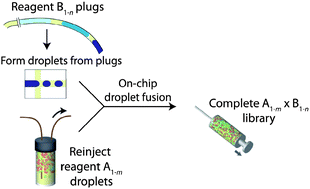Microfluidic platform for combinatorial synthesis in picolitre droplets†
Abstract
This paper presents a droplet-based microfluidic platform for miniaturized combinatorial synthesis. As a proof of concept, a library of small molecules for early stage

* Corresponding authors
a
Institut de Science et d'Ingénierie Supramoléculaires (ISIS), Université de Strasbourg, CNRS UMR 7006, 8 Allée Gaspard Monge, 67083 Strasbourg Cedex, France
E-mail:
griffiths@unistra.fr
b
Department of Chemistry, University of Cambridge, Lensfield Road, Cambridge, UK
E-mail:
wtsh2@cam.ac.uk
c
Radboud University Nijmegen, Institute for Molecules and Materials, Heyendaalseweg 135, 6525 AJ Nijmegen, The Netherlands
E-mail:
w.huck@science.ru.nl
This paper presents a droplet-based microfluidic platform for miniaturized combinatorial synthesis. As a proof of concept, a library of small molecules for early stage

 Please wait while we load your content...
Something went wrong. Try again?
Please wait while we load your content...
Something went wrong. Try again?
A. B. Theberge, E. Mayot, A. El Harrak, F. Kleinschmidt, W. T. S. Huck and A. D. Griffiths, Lab Chip, 2012, 12, 1320 DOI: 10.1039/C2LC21019C
To request permission to reproduce material from this article, please go to the Copyright Clearance Center request page.
If you are an author contributing to an RSC publication, you do not need to request permission provided correct acknowledgement is given.
If you are the author of this article, you do not need to request permission to reproduce figures and diagrams provided correct acknowledgement is given. If you want to reproduce the whole article in a third-party publication (excluding your thesis/dissertation for which permission is not required) please go to the Copyright Clearance Center request page.
Read more about how to correctly acknowledge RSC content.
 Fetching data from CrossRef.
Fetching data from CrossRef.
This may take some time to load.
Loading related content
